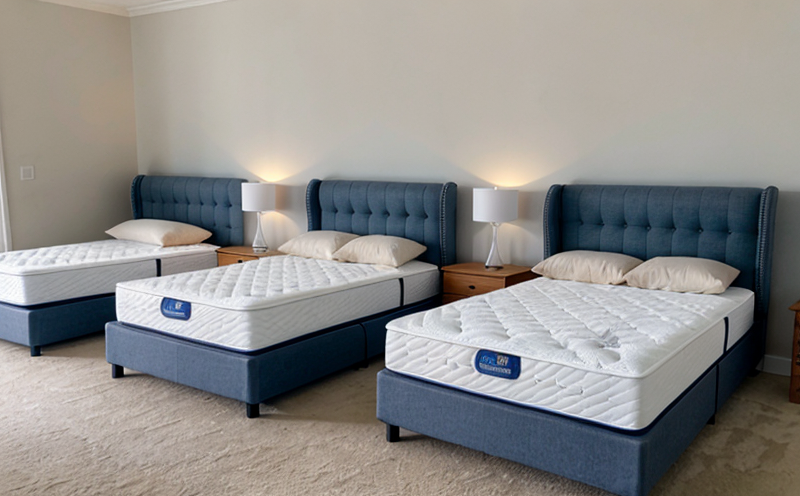BS EN 28992 Fatigue and Performance of Adjustable Bed Mechanisms Testing
The BS EN 28992 standard is a critical reference for manufacturers, quality managers, and compliance officers in the furniture industry. This standard is specifically designed to ensure that adjustable bed mechanisms are durable and reliable over extended use. The fatigue testing outlined by this standard helps guarantee that beds and mattresses equipped with such mechanisms meet performance requirements under various stress conditions.
The BS EN 28992 standard focuses on the fatigue life of the mechanisms used in adjustable beds, which can include gas springs, hydraulic systems, or pneumatic actuators. The test aims to determine how many cycles the mechanism can withstand before showing signs of failure. This is particularly important as users often adjust their beds multiple times throughout a night, over years of use.
The testing process involves subjecting the adjustable bed mechanism to repetitive loads and motions that mimic real-world usage patterns. These tests are designed to simulate the kind of stress and strain that can cause wear and tear on the mechanisms. The standard specifies the number of cycles required for this fatigue testing, which varies depending on the type of mechanism being tested.
For instance, gas springs might be subjected to a higher cycle count than hydraulic systems due to differences in material properties. Additionally, the test setup must replicate real-world conditions as closely as possible. This includes using actual components from the bed frame or mattress, ensuring that any external factors such as bedding type and weight are accounted for.
The testing apparatus used is typically a specialized fatigue tester capable of applying precise loads at controlled rates. The tester can be programmed to simulate different use cases, such as adjusting the headboard up and down repeatedly or varying the angle of the bed. This allows for a comprehensive evaluation of how the mechanism performs under various conditions.
Once the testing is complete, detailed reports are generated that document the performance of the adjustable bed mechanisms. These reports often include graphs showing the number of cycles achieved before failure, any signs of wear or damage observed during the test, and recommendations for improvement based on the findings. Compliance with this standard ensures that manufacturers can provide beds that meet both functional and safety requirements.
The BS EN 28992 standard is particularly relevant in the context of adjustable beds because these products are often used by elderly individuals or those recovering from injuries. Ensuring that the mechanisms function reliably for extended periods is crucial to maintaining patient comfort and preventing accidents due to faulty equipment.
Manufacturers who adhere to this standard not only enhance their product quality but also demonstrate a commitment to safety and customer satisfaction. This can be particularly beneficial in competitive markets where reputation plays a significant role in consumer choice.
Industry Applications
- Manufacturing facilities of furniture companies seeking compliance with international standards.
- R&D departments focused on improving the durability and performance of adjustable bed mechanisms.
- Procurement teams looking for suppliers that meet stringent quality criteria.
- Safety regulators ensuring consumer protection in the furniture industry.
Customer Impact and Satisfaction
The impact of adhering to BS EN 28992 extends beyond just compliance; it significantly enhances customer satisfaction. When beds and mattresses come with mechanisms that pass these rigorous tests, customers can expect a product that is not only durable but also safe to use over extended periods.
For elderly users or individuals recovering from injuries, the reliability of the adjustable bed mechanism is crucial. Knowing that their bed will continue to operate smoothly without unexpected failures provides peace of mind and enhances overall quality of life. This can be particularly important in healthcare settings where patients need reliable equipment for recovery.
In addition to enhancing customer satisfaction, meeting this standard also helps manufacturers build a strong reputation. By demonstrating compliance with international standards, companies position themselves as leaders in product quality and safety. This can attract more customers and potentially increase market share.
The detailed reports generated from the testing process provide valuable insights that can be used for continuous improvement. Manufacturers can use these findings to identify areas where their products are performing well and those requiring enhancement. This iterative approach not only improves product quality but also sets a precedent for excellence in manufacturing practices.
Environmental and Sustainability Contributions
The BS EN 28992 standard indirectly contributes to environmental sustainability by promoting the use of high-quality, durable products. By ensuring that adjustable bed mechanisms are reliable over extended periods, this standard reduces waste associated with frequent replacement due to premature failure.
Durable furniture not only saves consumers money in the long run but also minimizes the environmental impact of manufacturing and disposing of defective products. This contributes to a more sustainable use of resources throughout the product lifecycle.
Furthermore, by ensuring that beds are safe and reliable, this standard helps prevent accidents caused by faulty equipment. Such accidents can lead to injuries or even fatalities, which have significant environmental and social costs. By promoting safer products, this standard indirectly supports public health and safety, thereby contributing positively to the overall environment.
Manufacturers who adhere to this standard are also more likely to use sustainable materials in their production processes. This is because high-quality, durable products often require higher quality components, including those that are environmentally friendly or recyclable. The emphasis on reliability and performance encourages a shift towards more responsible sourcing and manufacturing practices.





